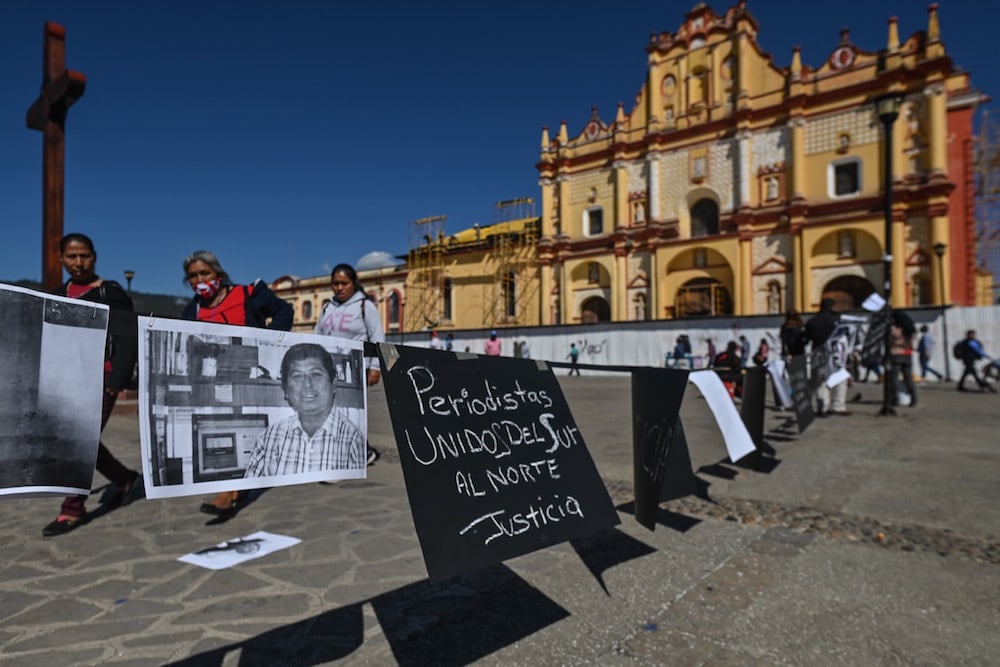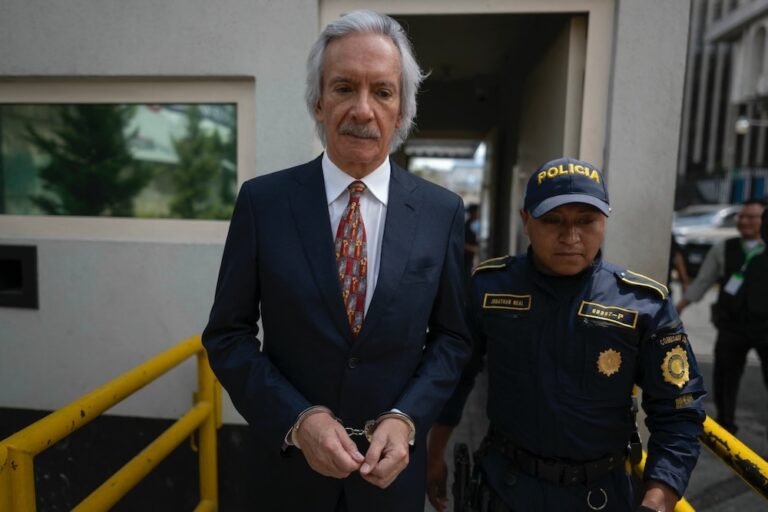January 2022 in the Americas: A free expression round up produced by IFEX's Regional Editor Laura Vidal, based on IFEX member reports and news from the region.
The year started violently, especially for journalists in Mexico, Haiti, Colombia, and Venezuela. El Salvador confronts an aggressive surveillance campaign. A complex set of challenges in a region that is bracing itself to fight back.
A violent start to the year
January was full of setbacks for the security of journalists. In less than a month, Mexico saw the attacks and killings of five journalists, two of them in the same week, in the border city of Tijuana. On 10 January, the body of José Luis Gamboa was found in Veracruz, on 17 January, Alfonso Margarito Martínez Esquivel was shot dead; Maria Guadalupe Lourdes Maldonado was also shot and killed outside her home on 23 January; local media in Yucatan reported on 19 January that journalist Jaime Vargas had been stabbed and is now in hospital; and finally, on 31 January, Roberto Toledo was killed in Michoacán.
For over two decades now, Mexico has been considered one of the most dangerous countries for journalists, something that prompted IFEX, together with many other organizations, to be part of an international visit in 2019, a year after president Andrés Manuel López Obrador took office. According to the report, certain commitments were made and welcomed at the time, like the guarantee of sufficient funds for the Federal Mechanism for the Protection of Human Rights Defenders and Journalists. However, the organizations lamented the “gaps in understanding” between the government and the goals of the Mission, something that can be seen, for example, in the ongoing antagonistic discourse toward the critical press.
The tragic events that marked the beginning of 2022 highlight the long road that is still ahead in terms of taking action to protect journalists and human rights defenders in Mexico. One of the few commitments of the Mexican state in this regard, protection mechanisms for journalists at the federal and state levels, is proving to be insufficient. Lourdes Maldonado and Roberto Toledo – as well as other journalists who have been killed in Mexico – were enrolled in such programs. At the time of writing this brief, IFEX member Committee to Protect Journalists had reached out to the Federal Mechanism for the Protection of Human Rights Defenders and Journalists for comment, but had not received a reply.
The news of Maldonado’s death sparked a call to action from Mexican journalists around the country. Thousands of people in several cities joined the protests, despite the pandemic.
Journalist Estrella Pedroza, one of the organizers of the protest, highlighted the particular risks women journalists face: “What is particularly scary to me is how they shot a female colleague, almost in front of her home […] If journalism is dangerous work, it’s doubly so for women.” Reporter Alejandro Castro also spoke to CPJ, pointing out that the protests could be “a watershed moment in the collective struggle for better, safer and dignified working conditions,” and saw the leading participation of young journalists as a signifier for “a generational change.”
In Venezuela, José Gregorio Urbina, director of community radio station Frontera 92.5 FM, was killed on 10 January at his residence in Puerto Páez, in the border state of Apure, according to IFEX member IPYS Venezuela. Urbina was also active in local political circles, including the Communist Party of Venezuela, which claimed on Twitter that Urbina had received threats from the Venezuelan National Guard after speaking up against falsos positivos in the region [the killing of civilians presented to authorities as guerrilleros killed in battle] that had been allegedly orchestrated by them.
In Haiti, the gang fights that are dominating the landscape in many of the poorest neighborhoods in the outskirts of Port au Prince are part of the deepening social, political and security crisis that followed the assassination of President Jovenel Moise – and the risks to journalists reporting on them are intensifying. Amady John Wesley and Wilguens Louissaint were killed while reporting on the conflicts that had been taking place close to the capital. DW reports that the journalists were attacked, allegedly by two gang members, while trying to interview a rival leader.
In Colombia, a car bomb exploded outside local media outlet Trochando Sin Fronteras and local radio station Sarare Stereo in Saravena, close to the Venezuelan border, destroying their offices, and damaging equipment, including the antennas. According to IFEX member the Fundación para la Libertad de Prensa (FLIP), seven journalists in Arauca had been pressured by the National Liberation Army (ELN) and other FARC dissident groups to publish information they were sending via WhatsApp, and threatened them if they didn’t follow their orders. The region has seen an alarming increase in attacks against journalists and the press following the 2016 Peace Process.
Pegasus found in at least 35 journalists’ devices in El Salvador
The spyware developed by Israeli NSO group was once again found to be in use as part of an aggressive surveillance campaign against journalists, this time in El Salvador. Despite repeated claims from NSO affirming that Pegasus is only sold to governments and that it is meant to be used to fight criminality and terrorism, the malware continues to be found among surveillance efforts aimed at journalists and activists critical of certain governments. This last wave of surveillance was exposed thanks to an investigation led by a coalition of digital rights organizations, among them Access Now, Citizen Lab and Social TIC. They found that the journalists targeted were connected to local media outlets, such as El Faro, Gato Encerrado, La Prensa Gráfica, Revista Digital Disruptiva, Diario El Mundo, and El Diario de Hoy, in addition to two independent journalists. As is frequently the case, civil society organizations were also targeted, including Fundación DTJ and Cristosal.
Through forensic analysis, the investigation highlighted how the surveillance targeting El Faro was particularly aggressive, and coincided with tense political moments and important revelations, such as President Nayib Bukele’s negotiations with the MS-13 gang for political support. “Learning of the spying against us hasn’t come as a surprise, but the quantity, frequency, and duration of the infections have. Almost all of El Faro has been infected,” said Carlos Dada, El Faro’s founding director.
Bukele’s hostility to the press and civil society organizations has been palpable from the start; but as Dada told Nicaragua’s news outlet Confidencial, this surveillance campaign makes their work even more difficult. Journalists in El Salvador have barely any access to public information and depend deeply on their sources, who are, with these kinds of attacks, put at great risk.
IFEX members ARTICLE 19 – Mexico and Central America and ARTICLE 19 – Brazil, Fundación Karisma, Derechos Digitales, R3D, and EFF signed a joint statement with other organizations, calling on international and regional bodies to take urgent actions to counter the “explosion of the use of government-mandated surveillance supported by private companies like NSO Group.” It emphasizes the pernicious impact of allowing surveillance to go unchallenged:
“The lack of accountability for such egregious conduct by public authorities and private companies allows the surveillance culture to flourish, and destroy human rights.”
More challenges are coming, with the passing of five amendments to El Salvador’s Penal Code allowing “hidden digital agents” to access data and information in any device in order to fight “cyber crime”. While some members of Congress behind the reform say their goal is not to intercept journalists’ communications, civil society organizations fear that this new element of the law will “make spying legal”.
In brief
Twenty seven recommendations for Venezuela: IFEX member IPYS Venezuela summarized the recommendations made by 25 member states during the third cycle of the country’s Universal Periodic Review, calling on the Venezuelan State to promote freedom of the press, reopen media outlets that have been closed, guarantee journalists’ safety, and stop the persecution and criminalization of journalists. The recommendations were in sharp contrast to the State’s report, in which it was stated that journalists perform their daily work “without any limitations other than those stipulated by the law and the Constitution”.
Legal harassment in Peru: A criminal court judge in Lima found journalist Christopher Acosta and Penguin Random House Peru director Jerónimo Pimentel guilty of defamation against former mayor and two-time presidential candidate César Acuña. The court sentenced both Acosta and Pimentel to two-year suspended prison terms and they were ordered to pay Acuña a total of 400,000 sols (US$102,608). Natalie Southwick, CPJ Latin America and Caribbean program coordinator, said the conviction “is the latest egregious example of how criminal defamation laws and the Peruvian justice system are consistently used to stifle reporting on stories in the public interest.” Voces del Sur and IPYS released a statement rejecting the court’s decision; while the Special Rapporteur for Freedom of Expression of the Inter-American Commission on Human Rights published a press release expressing concern and warning about “its potential intimidating effect.”
U.S. Actions need to live up to rhetoric: A CPJ special report highlights the “stark contrast” between the discourses of Donald Trump and Joe Biden towards the press, but points at attitudes that continue to worry press freedom advocates. They observe “the president’s limited availability to journalists, the administration’s slow responses to requests for information, its planned extradition of Julian Assange, restrictions on media access at the U.S. southern border, and its limited assistance to Afghan journalists.”
Canada: The Canadian Association of Journalists is urging newsrooms to consider safety options for their reporters covering the ongoing protests conducted by truck drivers in Canada against COVID-19 vaccine requirements – known as “Freedom Convoy 2022″ – as threats of violence and harassment towards journalists increase: “Journalists have received death threats littered with racist epithets. Others have been spat on and verbally and physically harassed. In another case, the windows of a CBC/Radio-Canada news cruiser were broken.”
Guatemala: an anti-trans bill looming in the horizon. A group of lawmakers are using a rhetoric of protection against “gender identity disorders” to justify a bill that could “ban the dissemination of any information about transgender identity in school sex education curricula,” according to Human Rights Watch. Cristian González Cabrera, LGBTQ+ rights researcher, highlighted that the bill “is unscientific and stigmatizes transgender people as a corrupting influence, harmful to children” – something that increases even more the threat of violence against Guatemala’s trans community.



